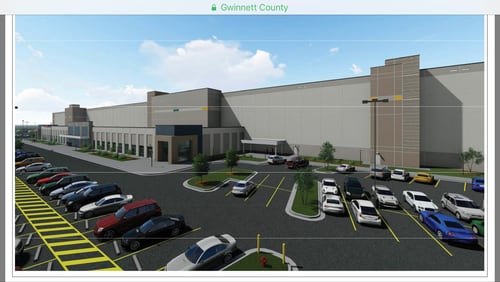DeKalb commissioners voted Tuesday night to deny the zoning adjustments necessary for a small part of the massive — and mysterious — “Project Rocket” to be built in their county.
The vote raises plenty of questions and may complicate things moving forward. But it appeared unlikely to nix the entire Gwinnett-based project, which involves a 2.5-million-square-foot warehouse and distribution facility expected to create more than 1,000 jobs.
“Most likely not,” said Laurel David, an attorney representing the project, “but we’d have to go back to the end user and the developer.”
The code-named project — whose ultimate tenant has not been revealed — would be built primarily on 78 acres along West Park Place Boulevard in nearby Gwinnett County. The entirety of the actual building, in fact, would be within Gwinnett boundaries, and that county's commission approved last week the height variance necessary for it to be built.
Plans, though, also call for a private drive to be built from the facility out to Bermuda Drive — through a roughly 12-acre chunk of DeKalb County. About three dozen of the development’s 1,800 parking spaces are also proposed to be in DeKalb.
In order to build the private drive, which would be one of three means of entering and exiting the facility, developers were seeking a tweak to zoning requirements that were adopted in 1986. At the time, a developer hoping to build a “light industrial park” on the DeKalb property got the necessary zoning — with the expressly stated condition that there be “no access from the development to Bermuda Road.”
Residents of subdivisions surrounding the proposed development have spoken against it at meetings in both Gwinnett and DeKalb counties, citing traffic and safety as primary concerns. Tuesday was no different, though they honed in more specifically on the Bermuda Road entrance.
“We need you in this particular instance to look out for DeKalb County,” said Lance Hammonds, who lives in the area and said he was also representing the DeKalb NAACP. “Gwinnett County in the past, they’ve shown that they’re not a good neighbor. They don’t care about the people in the area. They don’t even care about the people in south Gwinnett.”
DeKalb commissioners appeared to take the message to heart.
Despite claims from David, the project’s attorney, that no trucks would use the DeKalb entrance and that intersection improvements would actually help ease traffic in the area, the commission voted 5-2 to deny the proposal.
Nancy Jester and Kathie Gannon were the only commissioners to vote against the motion to deny.
No one on either side of the vote provided an in-meeting explanation of their decision, though Jester asked several questions about if the larger project would move forward with or without DeKalb’s approval.
David said it likely would, but that a traffic study on the project may have to be looked at again. The Atlanta Regional Commission and the Georgia Road and Tollway Authority previously approved the development as long as about $15 million of improvements proposed in the traffic study are completed in the surrounding area.
David said scheduled traffic improvements for the DeKalb side of Bermuda Road and nearby intersections may or may not happen without the driveway that extends into the county.
“If we’re not adding to that load … I’m not sure that that intersection would be improved,” she said.
Overall, Project Rocket is proposed to include 65 loading docks, 200 truck parking spaces and 1,800 employee parking spaces.
While the project’s potential tenant has not been revealed — even to many government officials — speculation has focused on e-commerce giant Amazon, which has reportedly been scoping out sites for a new Atlanta-are fulfillment center. Fulfillment centers are where customers’ orders are packed and shipped.
David said during Tuesday’s meeting that “the governor’s office has been heavily involved” in the process.
About the Author







